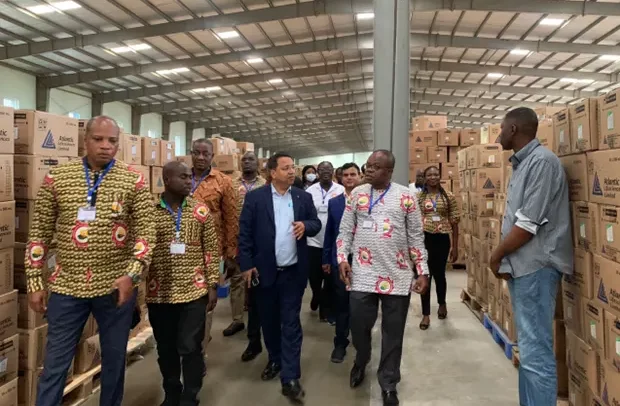Atlantic LifeSciences and PSGH officials on a tour of the facility
Atlantic LifeSciences limited, Ghana’s first steroid manufacturing company, is working to locally develop an alternative dialysis procedure called peritoneal dialysis.
This innovative treatment allows patients to administer the dialysis solution intraperitoneally, (through the serous membrane that lines the abdominal cavity) providing comfort and convenience, particularly for those living in areas with limited dialysis centers.
Quality Assurance Manager of Atlantic Lifesciences Ltd, Smart Bediako, indicated that by empowering patients to perform the treatment at home once trained, this breakthrough technology has the potential to save lives and improve the quality of life for many Ghanaians suffering from chronic kidney disease.
“The advantage being that patients can do that, even at home when they are well trained to be able to actually start the peritoneal dialysis, they can do it at home and that will save them the trouble of going to other places,” he said.
He made this known when the Pharmaceutical Society of Ghana (PSGH) paid a curtsey call to farmiliarise with the facility’s operations.
He said the company was currently producing anti-snake venom locally, to save the lives of people who are bitten by snakes, sometimes leading to deaths due to the lack of life-saving vaccines.
The anti-snake serum project has reached an advanced stage, with the company setting up a state-of-the-art fill and finish line.
He said they have successfully completed three batches of production and are now preparing to submit them for registration with the Food and Drugs Authority (FDA).
He noted that they are also collaborating with the Center for Plant Medicine Research in Mampong for potency testing to ensure the highest quality and safety standards.
He reported that three batches of anti-snake serum have been produced and will soon be submitted to the FDA for registration along with potency testing results from the Center for Plant Medicine Research.
Mr. Bediako emphasized the importance of affordable inputs, consistent energy supply, and supportive government policies.
“By granting VAT exemptions on necessary materials and reducing restrictions on imported products already available in abundance locally, Ghana can become a manufacturing hub and nurture the growth of companies like Atlantic Life Sciences,” he said.
President of the Pharmaceutical Society of Ghana, Dr. Samuel Kow Donkoh, stressed the need for the government to support local manufacturers to thrive.
The society also called on hospitals, clinics, and government agencies to prioritize products from Ghanaian pharmaceutical companies.
Tax exemptions on raw materials and preferential treatment in public procurement were suggested as ways to create an enabling environment.
“We need to see that we have to meet with the government, politicians and policymakers to put in certain policies to ensure that the right environment is created because they need an enabling environment to survive,” he said.
The PSGH also pledged to advocate for policies that promote at least 50 per cent local manufacturing by 2030.
This would entail exemptions needed by factories pioneering complex products like injectables.
By Nafisatu Abdul Razak

